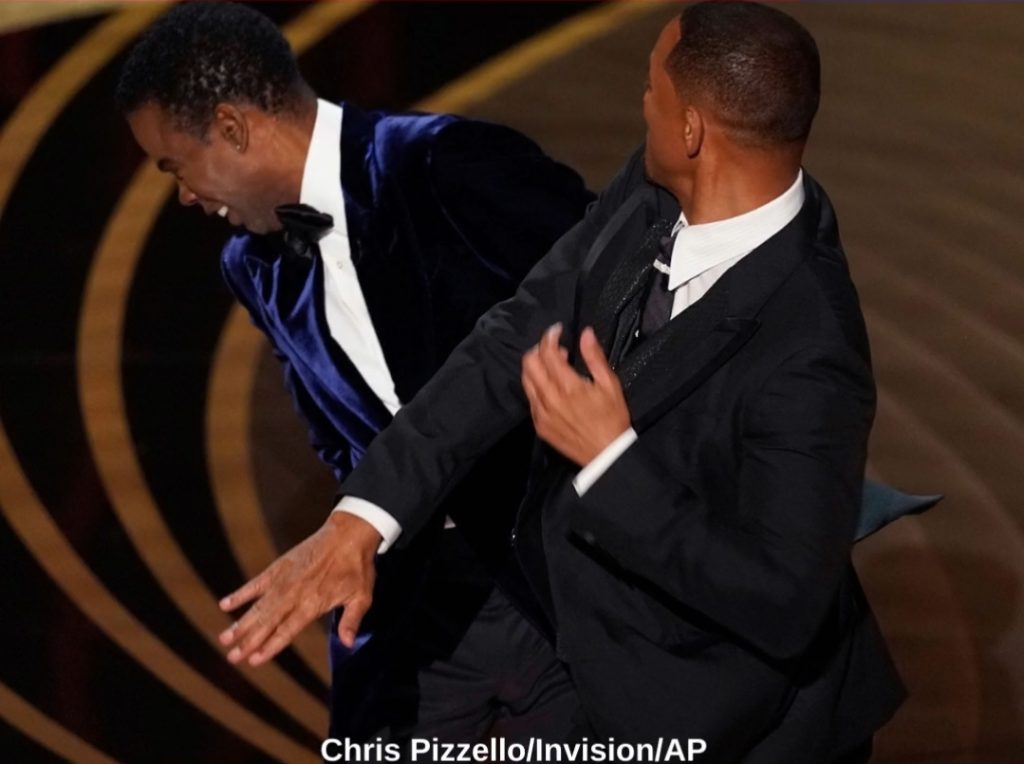(CNN) — “CODA” won best picture, but that historic breakthrough for streaming service Apple TV+ at the Oscars was overshadowed by one spontaneous act, as Will Smith delivered a viral moment that will be remembered and talked about for years.
The most memorable exchange on the film industry’s biggest night wasn’t the kind anyone would have anticipated or wanted. Before winning his Oscar for “King Richard,” Smith seemed upset about a joke that Chris Rock told about his wife, Jada Pinkett Smith, marching to the stage and appearing to strike him across the face. Rock looked genuinely stunned, while Smith returned to his seat, shouting words that were bleeped out at Rock.
According to CNN reporter Stephanie Elam, who is in the audience, she could hear Rock getting hit. Smith said twice during the incident, according to Elam, “Keep my wife’s name out of your f***ing mouth!”

Chris Rock made a joke about Jada Pinkett Smith’s shaved head. While presenting the award for best documentary, Rock joked, “Jada I love you, ‘G.I. Jane 2,’ can’t wait to see it.”
Pinkett Smith has been open about her struggle with alopecia, an autoimmune disorder that leads to hair loss
Wiping away tears, Smith during his acceptance speech referenced that the character he played, Richard Williams, protected his family, then said, without specifically mentioning Rock or what happened, “I want to apologize to the Academy. I want to apologize to all my fellow nominees.” He added, “Love will make you do crazy things.”
The best-picture suspense between two streaming nominees perceived as frontrunners lasted throughout the night. “CODA’s” Sian Heder won for best adapted screenplay, but “The Power of the Dog’s” Jane Campion, the first woman to be nominated twice as best director, later became the third woman ever to claim that prize. (Heder was overlooked in that balloting.)
Based on results from other awards leading up to the Oscars, this was already viewed as a landmark year for streaming services, which, led by Netflix, have steadily chipped away at industry resistance to seeing them as full competitors with major studio releases.
For all its hard work, though, Netflix didn’t catch the bouquet, as voters went with Apple’s more uplifting story, about the hearing child of deaf parents. Including this year’s contenders “The Power of the Dog” and “Don’t Look Up,” seven Netflix movies have now been nominated for best picture, but thus far none have won.
The global pandemic, which forced the entire entertainment industry into streaming mode for a time, has helped hasten streaming’s acceptance, with last year’s winner, “Nomadland,” having been directed to a rival streamer, Hulu.
In addition to Smith, Jessica Chastain nabbed her first Oscar for “The Eyes of Tammy Faye,” playing Tammy Faye Bakker, which was also recognized for makeup and hairstyling.
In her acceptance Chastain spoke of “discriminatory and bigoted legislation that is sweeping our country” against the LGBTQ+ community, citing Bakker’s compassion toward those groups, which was depicted in the film.
With a third of the Oscars being handed out before the live telecast officially began, the Academy of Motion Picture Arts and Sciences bet that people would watch the 94th annual Academy Awards as much to be entertained as to find out who won what.
The Academy, which presents the awards, implemented a controversial plan to hand out awards in eight categories prior to the main telecast, then edit those selections into the show. Despite that decision, the telecast still ran more than 3 ½ hours.
The other big winner of the night was the science-fiction epic “Dune.” Dominating the technical categories, the Warner Bros. film claimed six Oscars for sound, film editing, production design, cinematography, visual effects and Hans Zimmer’s musical score. It was the prolific composer’s second win out of a dozen nominations, the first coming for “The Lion King” in 1995. (CNN and Warner Bros. are both part of WarnerMedia.)
The televised show underscored the emphasis on bringing more entertainment into the telecast, opening with Beyoncé performing the nominated song from “King Richard” outside the venue, before turning it over to hosts Regina Hall, Amy Schumer and Wanda Sykes, who gently roasted some of the nominees (“House of Gucci” was referred to as “House of Random Accents”) and taking aim at Florida’s “Don’t Say Gay” bill, promising, “We’re gonna have a gay night.” Sykes later directed a joke at Texas over its voter-registration laws.
Disney’s “Encanto” was honored as best animated movie. Although the film performed reasonably well in theaters, it (and its music) appeared to particularly catch on after making its debut on the studio’s streaming service, Disney+, symbolic of a year viewed as streaming’s awards coming-out party.
Supporting actress and actor represented perhaps the night’s least-suspenseful selections, but were among the most emotional, with Ariana DeBose and Troy Kotsur winning for Steven Spielberg’s remake of “West Side Story” and “CODA,” respectively. Kotsur becomes only the second deaf actor to be honored, following his co-star Marlee Matlin, who was recognized for “Children of a Lesser God” in 1987.
After thanking Spielberg and co-star Rita Moreno (who originally played the role), DeBose spoke of being a queer Afro-Latina woman, quoting the movie in saying to those who might be questioning how they fit in, “There is indeed a place for us.”
Questlove tearfully accepted an Oscar for his documentary “Summer of Soul,” and Japan’s “Drive My Car” earned best international film, with the three-hour drama having garnered a best picture nomination as well.
Kenneth Branagh, an eight-time nominee in various categories, received his first Oscar for writing “Belfast,” the deeply personal look at his homeland that he also directed and produced.
Although the Grammys and Tonys employ a similar format in time-shifting awards, many Academy members have complained about the perceived slight to those nominees. Nevertheless, there was a heightened sense of urgency to streamline the presentation after the Oscars slumped to record-low ratings last year, as did many major award shows.
The switch only saved a bit of time, which was used on lavish musical numbers — including a colorful rendition of “Encanto’s” song “We Don’t Talk About Bruno” — comedy bits like dropping Schumer from the rafters dressed as Spider-Man, and showcasing “fan favorites” as unscientifically voted on via Twitter.
The broadcast also incorporated its share of nostalgia, including a 60th-anniversary James Bond movie tribute, cast reunions from “White Men Can’t Jump,” “Juno” and “Pulp Fiction,” and a 50th-anniversary celebration of “The Godfather,” bringing director Francis Ford Coppola, Al Pacino and Robert De Niro out for a standing ovation.
The latest Bond film, “No Time to Die,” garnered best song for Billie Eilish and Finneas O’Connell, one of the few awards handed out to a box-office blockbuster, as the industry increasingly splits between popular and prestige fare.
The-CNN-Wire
™ & © 2022 Cable News Network, Inc., a WarnerMedia Company. All rights reserved.





More Stories
Bulls one win away from BABA title
Renewed efforts to deal with monkey population
Barbados joins several other countries recognising Palestine